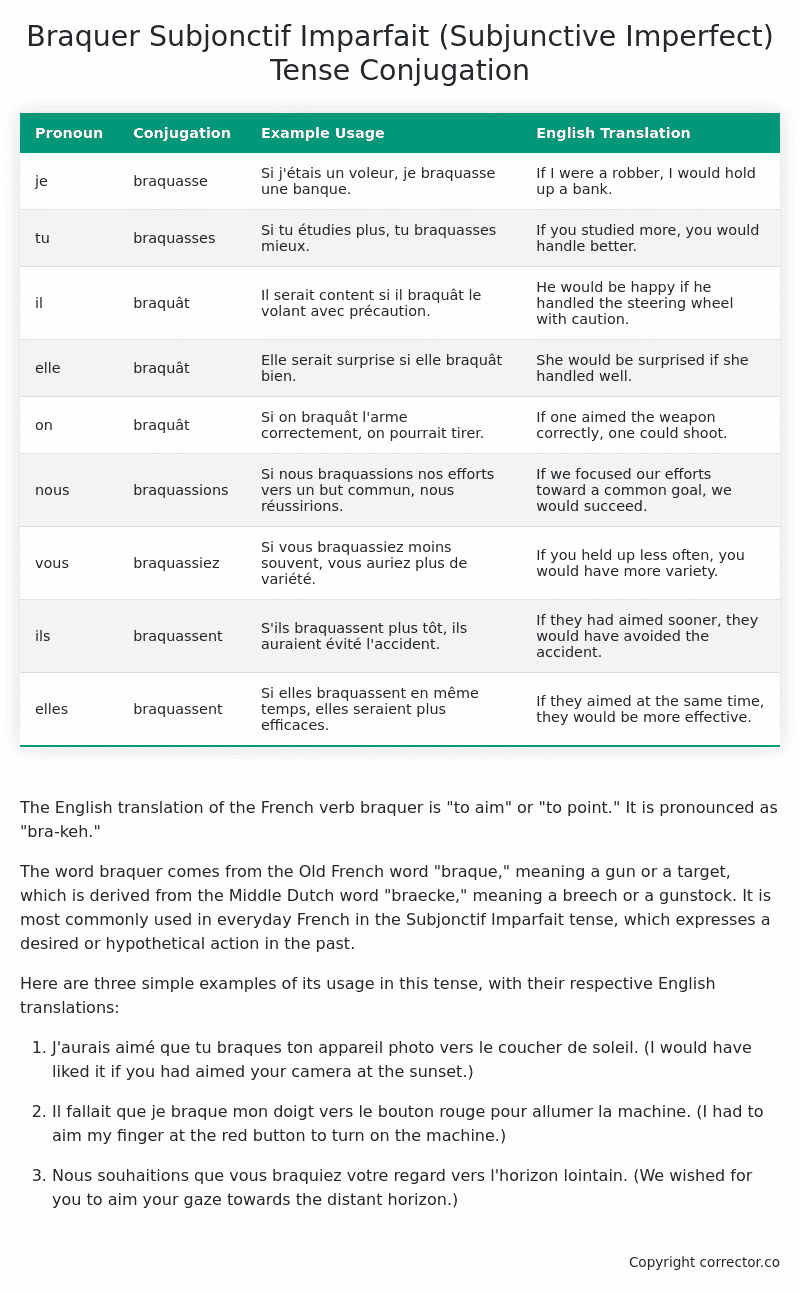Subjonctif Imparfait (Subjunctive Imperfect) Tense Conjugation of the French Verb braquer
Introduction to the verb braquer
The English translation of the French verb braquer is “to aim” or “to point.” It is pronounced as “bra-keh.”
The word braquer comes from the Old French word “braque,” meaning a gun or a target, which is derived from the Middle Dutch word “braecke,” meaning a breech or a gunstock. It is most commonly used in everyday French in the Subjonctif Imparfait tense, which expresses a desired or hypothetical action in the past.
Here are three simple examples of its usage in this tense, with their respective English translations:
-
J’aurais aimé que tu braques ton appareil photo vers le coucher de soleil. (I would have liked it if you had aimed your camera at the sunset.)
-
Il fallait que je braque mon doigt vers le bouton rouge pour allumer la machine. (I had to aim my finger at the red button to turn on the machine.)
-
Nous souhaitions que vous braquiez votre regard vers l’horizon lointain. (We wished for you to aim your gaze towards the distant horizon.)
Table of the Subjonctif Imparfait (Subjunctive Imperfect) Tense Conjugation of braquer
| Pronoun | Conjugation | Example Usage | English Translation |
|---|---|---|---|
| je | braquasse | Si j’étais un voleur, je braquasse une banque. | If I were a robber, I would hold up a bank. |
| tu | braquasses | Si tu étudies plus, tu braquasses mieux. | If you studied more, you would handle better. |
| il | braquât | Il serait content si il braquât le volant avec précaution. | He would be happy if he handled the steering wheel with caution. |
| elle | braquât | Elle serait surprise si elle braquât bien. | She would be surprised if she handled well. |
| on | braquât | Si on braquât l’arme correctement, on pourrait tirer. | If one aimed the weapon correctly, one could shoot. |
| nous | braquassions | Si nous braquassions nos efforts vers un but commun, nous réussirions. | If we focused our efforts toward a common goal, we would succeed. |
| vous | braquassiez | Si vous braquassiez moins souvent, vous auriez plus de variété. | If you held up less often, you would have more variety. |
| ils | braquassent | S’ils braquassent plus tôt, ils auraient évité l’accident. | If they had aimed sooner, they would have avoided the accident. |
| elles | braquassent | Si elles braquassent en même temps, elles seraient plus efficaces. | If they aimed at the same time, they would be more effective. |
Other Conjugations for Braquer.
Le Present (Present Tense) Conjugation of the French Verb braquer
Imparfait (Imperfect) Tense Conjugation of the French Verb braquer
Passé Simple (Simple Past) Tense Conjugation of the French Verb braquer
Passé Composé (Present Perfect) Tense Conjugation of the French Verb braquer
Futur Simple (Simple Future) Tense Conjugation of the French Verb braquer
Futur Proche (Near Future) Tense Conjugation of the French Verb braquer
Plus-que-parfait (Pluperfect) Tense Conjugation of the French Verb braquer
Passé Antérieur (Past Anterior) Tense Conjugation of the French Verb braquer
Futur Antérieur (Future Anterior) Tense Conjugation of the French Verb braquer
Subjonctif Présent (Subjunctive Present) Tense Conjugation of the French Verb braquer
Subjonctif Passé (Subjunctive Past) Tense Conjugation of the French Verb braquer
Subjonctif Imparfait (Subjunctive Imperfect) Tense Conjugation of the French Verb braquer (this article)
Subjonctif Plus-que-parfait (Subjunctive Pluperfect) Tense Conjugation of the French Verb braquer
Conditionnel Présent (Conditional Present) Tense Conjugation of the French Verb braquer
Conditionnel Passé (Conditional Past) Tense Conjugation of the French Verb braquer
L’impératif Présent (Imperative Present) Tense Conjugation of the French Verb braquer
L’infinitif Présent (Infinitive Present) Tense Conjugation of the French Verb braquer
Struggling with French verbs or the language in general? Why not use our free French Grammar Checker – no registration required!
Get a FREE Download Study Sheet of this Conjugation 🔥
Simply right click the image below, click “save image” and get your free reference for the braquer Subjonctif Imparfait tense conjugation!

Braquer – About the French Subjonctif Imparfait (Subjunctive Imperfect) Tense
Formation
Common Everyday Usage Patterns
Interactions with Other Tenses
Subjonctif Présent
Indicatif Passé Composé
Conditional
Conditional Perfect
Summary
I hope you enjoyed this article on the verb braquer. Still in a learning mood? Check out another TOTALLY random French verb conjugation!


